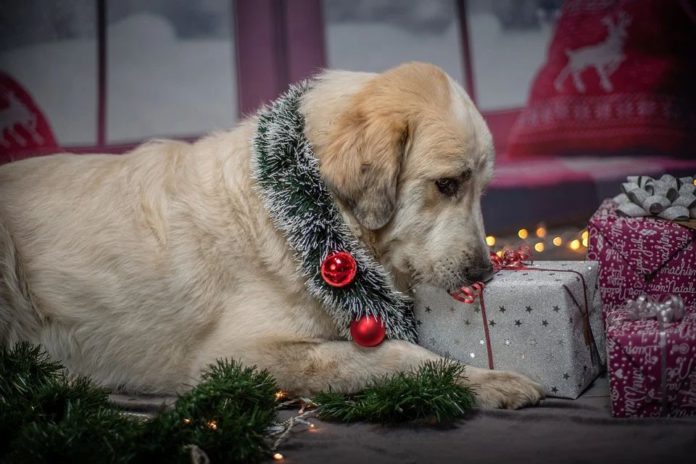Although Christmas food is one of the best parts of festive traditions for most families, several items on your plate could be harmful to dogs if they get their paws on them.
The insurance experts at money.co.uk have compiled a list of which Christmas foods to keep away from your dogs and which leftovers they can eat in moderation.
Stuffing
If you plan to eat sage and onion stuffing, hide it from your dogs (and cats).
Onions, garlic, chives, shallots, and leeks belong to the allium plant. When ingested, it can damage your dog’s red blood cells, which transports oxygen from the lungs to the body’s tissues.
They may experience an increased heart and respiratory rate, weakness, and diarrhoea. Some symptoms may not be visible until a few days after.
Blue cheese
Most dogs love cheese, but avoid blue cheeses like stilton and Roquefort due to a fungus called Roquefortine C.
Dogs are sensitive to this substance which can cause high temperature, vomiting, diarrhoea and convulsions (muscle tremors and seizures).
Also, remember that if you add grapes to your cheese board, keep them away from your four-legged friend as they can also cause problems if ingested.
Chocolate
Despite being a favourite festive treat for humans, chocolate poses a real threat to our dogs.
The chemical compound theobromine is a stimulant, like coffee for humans. It can be fatal depending on the size of your dog and the colour of the chocolate.
The darker the chocolate, the higher the toxicity. So, hide your advent calendars and celebrations boxes in a secure location!
Nuts
Although not all nuts are toxic to dogs (aside from the high-fat content and choking hazards), ensure you keep macadamia nuts and black walnuts away from your dog’s paws.
Macadamia nuts and black walnuts can result in a lethargic reaction, such as wobbly legs and stiffness, vomiting and seizures if consumed.
Christmas treats with raisins
While Christmas treats like Christmas pudding, Christmas cake and mince pies are enjoyed among humans, our furry friends should not eat them due to the sultanas and raisins.
These fruits are dried grapes and could potentially lead to kidney failure, even when cooked in baked treats.
Alcohol
No matter the occasion, do not give alcohol to our pets.
Dogs are more sensitive to ethanol than humans. Therefore, drinking even a little could cause drowsiness and, in more serious cases, result in low sugar levels and seizures.
Which leftovers can I give to my dogs (in moderation)?
- Protein food items like cooked turkey, chicken and salmon are fine for dogs to eat. If you are seasoning your meats, ensure you do not give your dog the skin or cooked bones
- Vegetables such as carrots, peas, green beans, and parsnips are nutritious. Therefore, they are a safe option but again, avoid any cooked with salt
- Alternatively, try baking pet-friendly Christmas snacks.
Food for dogs
Salman Haqqi, a pet insurance expert at money.co.uk, commented on the festive foods that are toxic to our pets:
“As we enter the festive period, many of us will want to ensure our pets can join in on the celebrations.”
“But it is important to remember that they can’t eat the same foods as humans.“
“Before feeding your dog anything which isn’t their regular food or treat, it is worth doing your research on whether it will be harmful to your furry companion.”
“If you are keen to feed your dog a Christmas dinner, it is worth sticking to unseasoned healthy leftovers like carrots and parsnips.”
“Or you could make them pet-friendly Christmas treats to ensure they are only eating what is suitable for their digestive systems.”
Haqqi advised that to avoid mishaps in the home while cooking Christmas dinner or opening presents, secure the area so your dog cannot reach surfaces.
“Be sure to tell your family members the dangers of giving bits of their dinner away,” she concluded.
Other articles:





